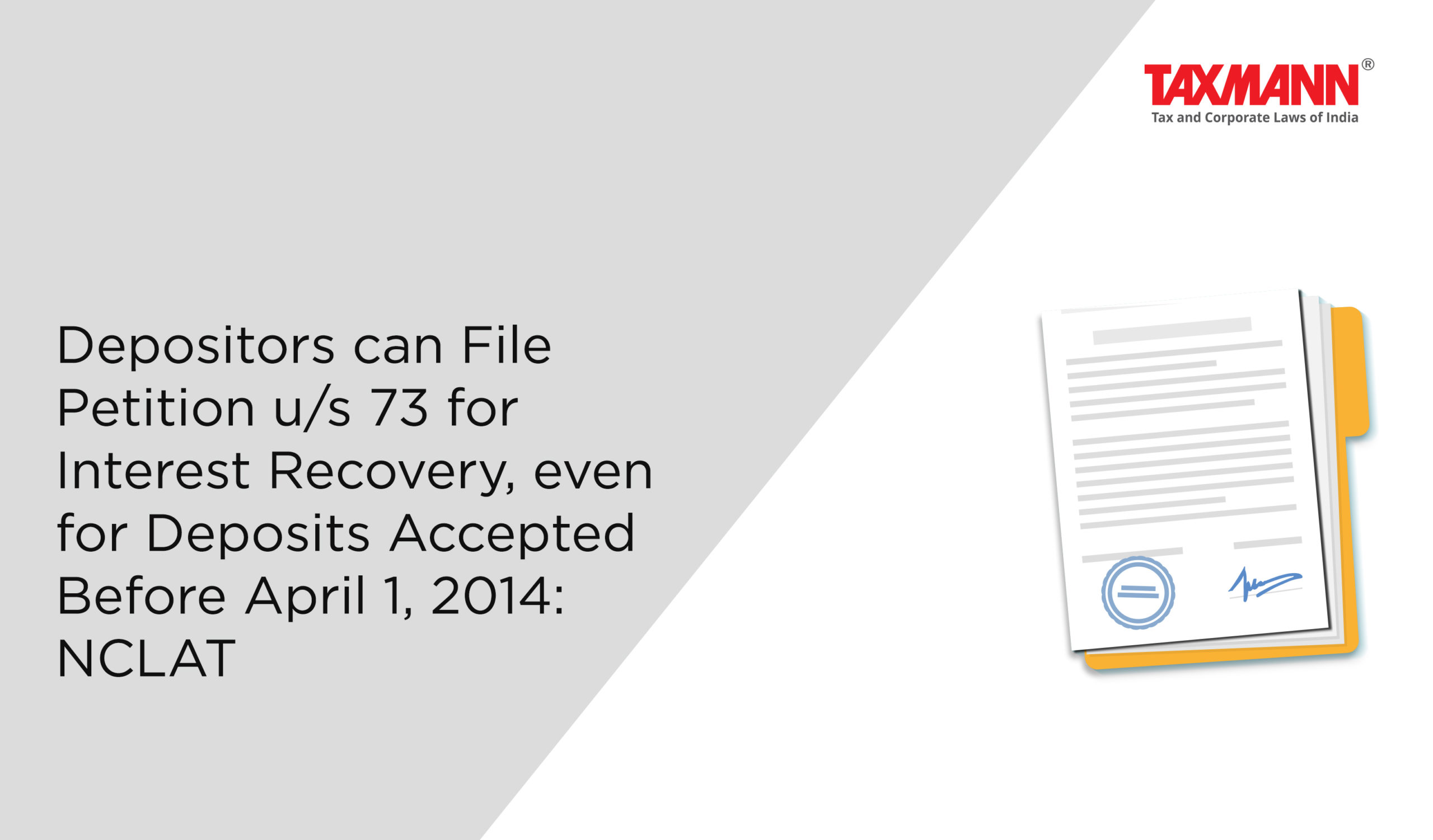Depositors can File Petition u/s 73 for Interest Recovery, even for Deposits Accepted Before April 1, 2014: NCLAT
- Blog|News|Company Law|
- 2 Min Read
- By Taxmann
- |
- Last Updated on 21 June, 2023

Case Details: Jaiprakash Associates v. Neena Somani - [2023] 150 taxmann.com 317 (NCLAT-New Delhi)
Judiciary and Counsel Details
-
- Rakesh Kumar, Judicial Member & Dr Ashok Kumar Mishra, Technical Member
- Krishnendu Dutta, Sr. Adv. Ms Ruchira Gupta, Ms Nancy Shah & Rajat Sinha, Advs. for the Appellant.
- Vaibhav Shukla, Ms Durga Dutt, Ms Gitanjali N. Sharma, Ms Shefali M., Ravjyot Singh, Pratyush Miglani & Prakhar Srivastava, Advs. for the Respondent.
Facts of the Case
In the instant case, the respondent invested her money in the appellant company’s Fixed Deposit Receipts (FDR’s) prior to 1-4-2014. The Appellant-company had redeemed FDRs belatedly.
Thus, the Respondent filed petition a under section 73 of the Companies Act, 2013 and sought direction to appellant to make repayment of interest at rate of 12/12.5 per cent from date of maturity till date of actual payment.
The NCLT allowed said petition. Later, the Appellant challenged the said order before NCLAT on ground that application had been filed under section 73, which was applicable to deposits accepted on or after 1-4-2014 i.e., date on which section 73 was notified and not to deposits accepted prior to 1-4-2014.
Further, the FDRs showed that on date of maturity, interest would be seized and therefore, respondent was not entitled to get interest after due date.
Later, it was noted that by issuance of a Government of India circular i.e. General Circular No. 09/2015 dated 18-6-2015, it was clarified that depositors were free to file application under section 73(4), regarding repayment of deposit accepted even prior to 1-4-2014.
NCLAT Held
The NCLAT observed that if a person who accepts deposits fails to make payment after maturity and delay was on part of person accepting deposit, in that event such person would be liable to make payment of interest till actual payment.
The NCLAT held that the NCLT had committed no error in passing impugned order and appeal against order of NCLT was to be dismissed.
Disclaimer: The content/information published on the website is only for general information of the user and shall not be construed as legal advice. While the Taxmann has exercised reasonable efforts to ensure the veracity of information/content published, Taxmann shall be under no liability in any manner whatsoever for incorrect information, if any.

Taxmann Publications has a dedicated in-house Research & Editorial Team. This team consists of a team of Chartered Accountants, Company Secretaries, and Lawyers. This team works under the guidance and supervision of editor-in-chief Mr Rakesh Bhargava.
The Research and Editorial Team is responsible for developing reliable and accurate content for the readers. The team follows the six-sigma approach to achieve the benchmark of zero error in its publications and research platforms. The team ensures that the following publication guidelines are thoroughly followed while developing the content:
- The statutory material is obtained only from the authorized and reliable sources
- All the latest developments in the judicial and legislative fields are covered
- Prepare the analytical write-ups on current, controversial, and important issues to help the readers to understand the concept and its implications
- Every content published by Taxmann is complete, accurate and lucid
- All evidence-based statements are supported with proper reference to Section, Circular No., Notification No. or citations
- The golden rules of grammar, style and consistency are thoroughly followed
- Font and size that’s easy to read and remain consistent across all imprint and digital publications are applied



 CA | CS | CMA
CA | CS | CMA
